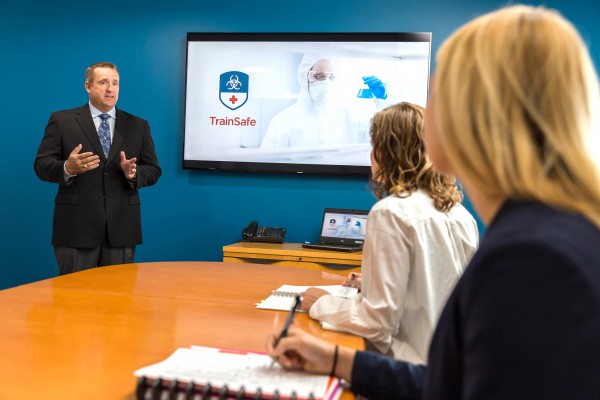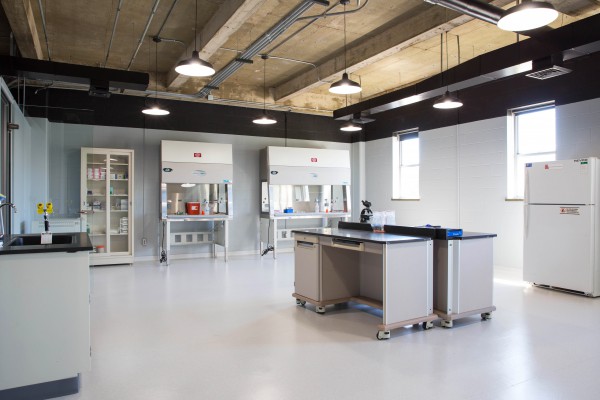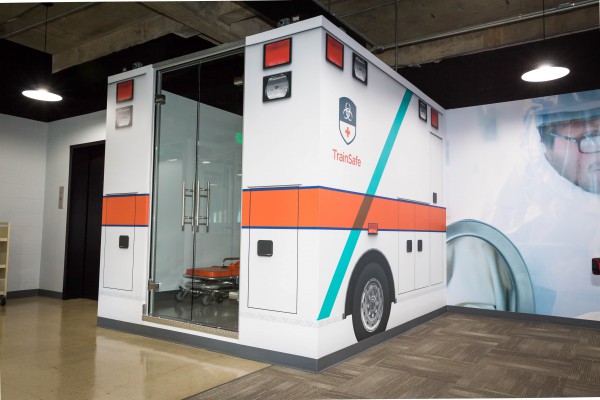Southern Research is launching a new biosafety training center as the centerpiece of an advanced program called TrainSafe to teach health care workers and laboratory staff how to protect themselves against pathogens responsible for serious infectious diseases.
Sean Kaufman, a national biosafety expert who prepared Emory University Hospital caregivers to treat two Ebola-infected patients in 2014, will direct training at the state-of-the-art Southern Research facility, which features a simulated Biosafety Level 3 (BSL-3) laboratory, ambulance bay, and hospital room.
Southern Research’s first TrainSafe class, focusing on biological risk mitigation in a BSL-3 lab, is scheduled to begin June 6. Click here to register.

“The Southern Research center is new and innovative, and I think this is a life-saving program that can help to protect entire communities,” said Kaufman, CEO and founder of Behavioral-Based Improvement Solutions in Atlanta.
“The consequences of having a laboratory staff member not being prepared to work with these very dangerous pathogens could be huge,” he added. “They could bring this home to their families. They can start outbreaks like we saw with SARS in China and Canada that go worldwide.”
A second tier of the TrainSafe program focuses on protective measures that front-line health care workers – doctors, nurses and emergency responders – need to use when encountering a patient suffering from a potentially deadly infectious disease.
“At Southern Research, we’re going to be training folks to make sure they do the right things when they are treating people with serious infectious diseases. We cannot repeat what happened in 2014 with the two nurses getting sick while treating an Ebola-infected patient in Texas,” Kaufman said.
HANDS-ON TRAINING
Art Tipton, Ph.D., president and CEO of Birmingham-based Southern Research, said it’s crucial that research laboratories and hospitals across the United States embrace a culture of safety and preparedness due to the rising threat of dangerous infectious diseases including Ebola, avian influenza and MERS.
“The multi-dimensional TrainSafe center demonstrates Southern Research’s commitment to being a leader in improving training and critical safety practices in environments such as laboratories and health care facilities. We are thrilled to be working with Sean on this important program,” Tipton said.
“Virulent infectious diseases are a growing public health threat, and this training program at our one-of-a-kind center will help lessen the risks posed by the unintentional spreading of these emerging diseases,” he added.

The TrainSafe facility is designed to permit practical, hands-on training in authentic environments. An advantage of the highly realistic mock BSL-3 lab is that training can take place at any time, unlike a fully operational lab, which would have to be shut down and decontaminated.
The ambulance bay and isolation room section of the TrainSafe center is designed to mimic the arrival of a severely sick patient for hospital care. Patient transport can be extremely hazardous for caregivers, who are often not prepared for contact with unfamiliar and dangerous infections.
Changing rooms in the facility will be used to instruct trainees how to safely put on, and take off, personal protective gear, including masks, gowns, gloves, positive-pressure respirators and full hazmat suits. Knowing how to remove this gear properly is particularly important in preventing accidental infections.
“Training is an opportunity to shake things up, challenge perceptions and make sure people are operating in a safe and effective manner while working in these situations,” Kaufman said.
COUNTERING EBOLA

Kaufman, a behavioral psychologist, has extensive biosafety training experience. He managed a training program at a simulated BSL-3 lab at another institution for 10 years and has conducted biosafety training for the Centers for Disease Control and Prevention, where he once worked.
In 2014, Kaufman conducted training exercises for doctors and nurses at Emory before two American volunteers working in West Africa during the Ebola outbreak arrived at the Atlanta hospital for treatment. He remained at the hospital to provide safety expertise during their care.
While no one was infected with Ebola there, the danger was highlighted later that year when two nurses at a Dallas hospital were infected with the virus while treating a patient who had contracted the disease while in Africa.
Kaufman says that episode underscores the need for more intensive training for health care workers.
“We have people working with very dangerous pathogens and very sick patients, and they don’t know what they are doing,” he said. “In working with laboratories over the last 12 years, I have had a chance to see that no matter where you are in your career, you still need training.”
During the decade he managed the training lab, Kaufman said more than 10,000 professionals from the global scientific community participated in the biosafety program. He expects a similar response to Southern Research’s TrainSafe initiative.
“This is an international program,” Kaufman said. “People will come from around the world.”